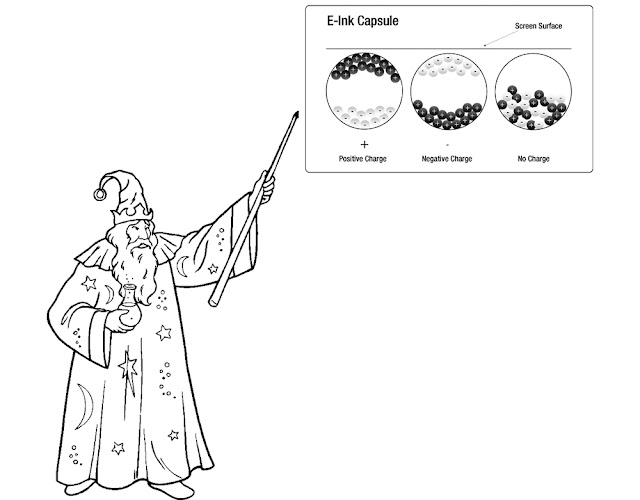"Since I am an avid reader, why not buy a Kindle?"
My initial answer?
I didn't like the Kindle when I first laid eyes upon it.
Look at that smug son of a bitch with all of its fancy buttons.
It was a knee-jerk reaction.
This was an object that was threatening to change everything. Kindle-advocates started dreamily talking about a future of digitized libraries, and how it would effectively stop the need to use paper. Everything we knew - the entire written history of mankind - would one day be contained within a single little device. With all of the physical space it could save, there would never be any need for actual library buildings ever again.
What seemed like an idealistic utopia to others sounded more like some sort of a post-apocalyptic techno-hellhole to me.
I tend to overreact.
There was no way I could imagine a world without books - old-fashioned books with covers both hard and soft, and text printed out upon their pulpy pages. I couldn't imagine buying a new book without that new book smell, or the satisfying crack of new binding. All of the ritual and pride that comes with buying a new book and finding a place for it on my shelves would be gone. It was horrifying.
My reverence for the old form of books stemmed from my grade school years. I wasn't a particularly outgoing child - unless you consider intermittent chatter about dinosaurs and planets to be outgoing. (Although I still find those things to be fine conversational topics, but I digress.) I was horribly shy, introverted, clumsy, and exceptionally terrible at sports. With little interest in the hustle and bustle of the playground, I naturally gravitated towards the library. It was as if the Gods of Literature had singled me out and groomed me into being an ideal bookworm.
When I started to read my first novel-sized book and realized that it was written by an actual person and hadn't just magically materialized itself onto a shelf, I was awestruck. I couldn't imagine the tremendous amount of sheer creativity and fortitude a single person had to contain to make one. Through reading not only did I vicariously live out a multitude of incredible adventures, but I felt an intimate connection to a wealth of great minds and imaginative storytellers who told them.
I tried to hold my resolve. I told myself I wouldn't ever buy a Kindle.
So, what broke me?
I am the product of a technologically-dependent generation. I grew up with all sorts of gadgets in my home – raised on a possibly unhealthy diet of Nintendo – and I got to witness the personal computer become a staple in every household.
Over the course my lifetime thus far, the world has entered into a new digital age.
The proliferation of technology is growing at an exceedingly fast rate. In 2002, only 19% of the world owned cellphones. That number is now at 67%. Within that same time span, the amount of internet users rose from 631 million to 1.8 billion. Twitter feeds have invaded our news channels. Everybody you could possibly know has a Facebook page. You can hardly throw a rock without hitting a Macbook, Xbox, Blu Ray player, iPod, iPhone, iPad, or any other iWhateverthefuck.
Pictured: An iWhateverthefuck. The worst part? It's self-aware.
Admittedly, I have an almost instinctual interest in these types of things. Through experiencing this ongoing evolution in technology, I have learned that change is unavoidable after a certain period of time, no matter how hesitant we are towards accepting it. And I have also learned that change is neither good nor bad. It just is. For all that is lost, there are often new gains to be found.
So it wasn't before my initial distrust faded away, and my curiosity finally gave into the mystique of this new gadget.
Then when I started to learn more about the Kindle, I realized just how goddamn cool it was. It was thin and light-weight, hardly weighing half a pound. Books can be ordered within seconds through a wireless connection. The font size is customizable and there's an option to add non-permanent highlights and notes. It has two built-in dictionaries that you can easily access in the middle of reading, just in case you come upon an unfamiliar word.
Even the screen itself is something of a wonder. It's actually not so much a screen as it is an electronic sheet of paper that uses actual ink particles. The final result is nearly indistinguishable from actual print, even a magnified level. This is how this process works, as succinctly described by the E-Ink Corporation’s website:
"The principal components of electronic ink are millions of tiny microcapsules, about the diameter of a human hair. In one incarnation, each microcapsule contains positively charged white particles and negatively charged black particles suspended in a clear fluid. When a negative electric field is applied, the white particles move to the top of the microcapsule to become visible to the reader. This makes the surface appear white at that location. At the same time, an opposite electric field pulls the black particles to the bottom of the microcapsules where they are hidden. By reversing this process, the black particles appear at the top of the capsule, which now makes the surface appear dark at that location."
I was reminded of a quote attributed to Arthur C. Clarke that says “Any sufficiently advanced technology is indistinguishable from magic.”



